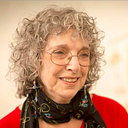Adoption: A Story of Loss
The following was prepared as a 5-minute audition read for “Listen to Your Mother” North Jersey 2020.
I was a teen in the 60’s — marching against segregation and the Vietnam war — and experimenting with drugs, sex and rock ’n’ roll.

But, the sexual revolution preceded “The Pill” and access to abortion, resulting in “out-of-wedlock” pregnancies and shame to the families of girls from middle and upper middle-class homes.
Adoption was intended to erase the “sin” of illicit sex while filling waiting arms. A “win-win.” “Homes for Unwed Mothers” became a thriving marketplace for highly-sought “illegitimate” white babies.[1] [2] [3]
1967 . . . “the summer of love” . . . I bore my first child.
Young and widowed, my parents thought adoption was the best option. Without support to raise my daughter as a single mom, I suffered the unimaginable trauma of losing her to adoption — a limbo loss wrapped in secrecy with no ritual to ease the grief. It was an event that shaped the rest of my life.
I married again in ’71 and became a stay-at-home mother of three. I was fortunate. Many mothers who lose their firstborn to adoption have no subsequent children.
But I never forgot as I was assured I would and in 1979 I co-founded Origins, a national support organization for mothers pressured into adoption. As we began to reconnect with our children, we discovered that adoption does not guarantee the “better life” we’d been told.[4] Mothers found deceased children and two mothers I know personally regained custody of their adopted and abandoned children.
I learned that adoptees are over-represented in: substance abuse and mental health facilities,[5] schools and ranches for troubled teens, as well as prisons.
Adoptees are also four times more likely to attempt suicide than non-adoptees.[6] [7]
In 1995, my 27-year-old daughter became another such fatal statistic.
Adoption is not the panacea we were led to believe, but a multi-billion-dollar, often corrupt, industry with children trafficked worldwide to fill a demand by those willing to paying tens of thousands of dollars.
Today, “open” adoption lures young mothers-to-be into thinking they’ll be Sunday parents. Not so. “Open adoptions” range from selecting and meeting adopters, to letter and photo exchanges, to contact. But promises of ongoing openness are unenforceable[8] [9] and often broken.
And, matching prospective adopters with expectant moms and allowing money to change hands creates false expectations for those hoping to adopt; pressure, obligation, and feelings of indebtedness for the mothers-to-be.
We need to get the money out of adoption and make it child-centered, not about filling a demand.
In order for adoption to be in the best interest of the child, unrelated placements must be the last resort after all efforts to help mothers and to find extended family, have been exhausted.
Today, I am a grandmother, an author and activist for adoptee rights because denying adoptees access to their original birth certificates, is in no one’s best interest.
I advocate for family preservation and tell my story hoping to prevent unnecessary and tragic family separations and loss.
Families in crisis — here and around the world — deserve to be helped not exploited. Taking children to fill a demand does nothing to ameliorate poverty, natural disasters, substance abuse, or any other crisis. Rather it adds lifelong, unresolvable grief for mothers[10] [11] [12]and creates feelings of abandonment, rejection, and identity confusion for those who are adopted. [13]
[1] The Girls Who Went Away: The Hidden History of Women Who Surrendered Children for Adoption in the Decades Before Roe v. Wade, Ann Fessler, https://www.amazon.com/Girls-Who-Went-Away-Surrendered/dp/0143038974
[2] Wake Up Little Susie: Single Pregnancy and Race Before Roe v Wade, Rickie Solinger, https://www.amazon.com/Wake-Up-Little-Susie-Pregnancy-dp-041590448X/dp/041590448X/ref=mt_hardcover?_encoding=UTF8&me=&qid
[3] Unwed Mother — ABC -TV News, Scope, 1965, https://www.youtube.com/watch?v=ASWPuMe5LRU
[4] Maltreatment of Adoptees in Adoptive Homes, Jessica A. K. Matthews, Ch 23, The Routledge Handbook of Adoption, edited by Gretchen Miller Wrobel, Emily Helder, Elisha Marr
[5] Adopted adolescents’ overrepresentation in mental health counseling: adoptees’ problems or parents’ lower threshold for referral? Miller BC, Fan X, Grotevant HD, Christensen M, Coyl D, van Dulmen M., J. Am. Acad. Child Adolescent Psychiatry. 2000 Dec; 39(12):1504–11, https://www.ncbi.nlm.nih.gov/pubmed/11128327
[6] Risk of Suicide Attempt in Adopted and Nonadopted Offspring, Margaret A. Keyes, Stephen M. Malone, Anu Sharma, William G. Iacono and Matt McGue, Pediatrics, October 2013, 132 (4) 639–646, https://pediatrics.aappublications.org/content/132/4/639
[7] Suicide, psychiatric illness, and social maladjustment in intercountry adoptees in Sweden: a cohort study.Hjern A1, Lindblad F, Vinnerljung B., Lancet. 2002 Aug 10;360(9331):443–8, https://www.ncbi.nlm.nih.gov/pubmed/12241716
[8] Are Open-Adoption Agreements Legally Enforceable? Annaleece Merrill, Utah State University in Logan, Utah, https://adoption.org/open-adoption-agreements-legally-enforceable
[9] The Reality of Open Adoption Agreements, Lita Jordan, April 25, 2018, https://adoption.com/the-reality-of-open-adoption-agreements
[10] Effects of adoption on the birth mother, https://en.wikipedia.org/wiki/Effects_of_adoption_on_the_birth_mother
[11] Lifelong Issues in Adoption, Deborah N. Silverstein and Sharon Kaplan, https://www.americanadoptioncongress.org/grief_silverstein_article.php
[12] Impact of Adoption on Birth Parents, https://www.childwelfare.gov/pubPDFs/f_impact.pdf
[13] 7 Core Issues in Adoption, Brooke Randolph, LMHC,
http://www.brooke-randolph.com/Blog/7_Core_Emotional_Issues_in_Adoption#ixzz6EiS7OyK1
